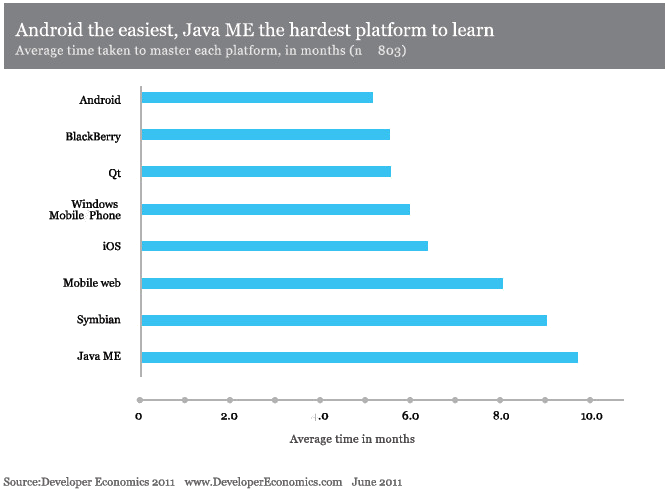We have mentioned before that Microsoft Windows is definitely there in terms of developer mindshare. However, developer support towards iOS and Android is so dominant due to those platform’s reach, and for Android, it was also considered by developers to be the easiest to develop for:
However, now it seems like Microsoft has been able to take advantage of something they have done so well for so long in the PC space: Provide excellent tools to ease development. According to Taiwanese ISV’s, development costs for Windows Mobile is 1/3 rd that of Android, mainly due to the development tools. The claims from Taiwan are actually quite staggering, and it would be interesting to hear if other developers in other countries feel the same.
Of course, reach is still a problem for Microsoft, and it is quite clear that Windows as a phone OS still struggles when you look at at markets like the US:
So the question the becomes, what will it take for Microsoft to increase its market share? Well, the obvious is more phones that people want to buy. For quite some time, Nokia has been the only company putting out any new Windows Phones, which of course Microsoft paid a hefty price for. Nokia is also an early supporter of Windows Phone 8, but the question remains whether the new Lumia’s will move the needle with consumers (Tomi Ahonen and Asymco seem to think they will not, which is too bad given Elop’s statement that this may be Nokia’s last chance).
However, there is hope in that other handset manufacturers like Samsung and HTC may move the needle, and they have certainly made good looking devices. Whether any of these first batch devices are good enough is quite questionable, but probably Windows Phone 8 is only a “Galaxy Siii away” from grabbing significant market share (I realized the pun in this one after writing it).
We fundamentally believe that consumer sentiment and loyalty is fickle, and really it should only take 1 really, really good device for consumers to embrace Windows Phone 8.
So assuming there will be good phones out there, what are the other things Microsoft has to get right? Well, there are a few. There has to be a healthy app eco-system beyond development tools. This is where Microsoft may be struggling, by closing the non-Microsoft shops and forcing sales through Windows Marketplace. While a closed system works well for Apple, we do not subscribe to that other players should follow the closed system strategy. iTunes is actually not good for the majority of app developers (90% make less than expected according to Vision Mobile), and having one place for discovery and purchase simply creates and over crowded space too quickly. Furthermore, the large app stores offer very little innovation in terms of content presentation, discovery or marketing (excluding Amazon here as they are the stand out as expected).
To get a healthy app eco-system, one must also have good business models in place. It should mean a free choice of in-app billing systems, so as to not constrain what developers are using. Here Microsoft for now is making the right decision by allowing developers to choose what they want to use.
So do we believe Windows Phone 8 will become a viable third OS? If some really good devices get made, and Microsoft does not over regulate the app market eco-system, there is no denying they will have the backing of the developers, and then eventually the consumers.
Share this article on

